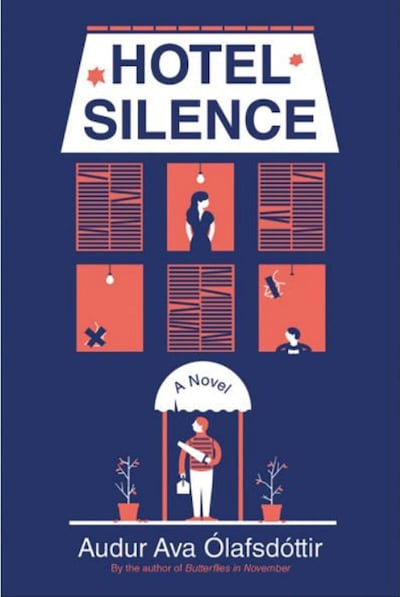When Auour Ava Olafsdóttir's novel Butterflies in November appeared in English in 2013, its readers were taken on a joyful Icelandic road trip.
After a run of bad luck, the book's unnamed female protagonist, a resident of Reykjavik like her creator, packs her bags, three goldfish, recently scooped lottery winnings and embarks on a journey of adventure and self-discovery with her best friend's deaf-mute son as a passenger.
The latest novel from Olafsdóttir in English (superbly translated by Brian FitzGibbon) follows another character beset by misfortune who sets out on a life-changing, mind-altering expedition.
Winner of the Icelandic Literature Prize, Hotel Silence turns out to be a darker affair than its zany predecessor, though.
In contrast to the beleaguered heroine of Butterflies, fallen hero Jónas doesn't drive off to escape himself, he takes flight (literally) to do away with himself. "I'm not a man who destroys things," he tells us, "but rather one who fixes things that are broken."
But DIY expert Jónas is unable to fix himself. The novel is his first-person account of the last days of his life. "Will the world miss me?" he asks, before answering himself with a resounding no.
After going through the eventualities of his death, Jónas deals with the practicalities.
He considers a day in May – around his 49th birthday. He mulls over a location and what clothes to wear; and he borrows a rifle from his neighbour Svanur – possibly arousing suspicion because hunting season is over. "What does one shoot in May apart from one's self?"
We learn that the three Gudrúns – the only women in Jónas’s life – have unwittingly pushed him to the edge.
His wife has left him, his mother is succumbing to dementia, and the daughter he believed was his is actually someone else’s.
So that none of them has to clear up his mess, he makes the decision to go on a one-way trip abroad. His destination is not a bucket-list hot spot but a war-ravaged danger-zone where, with luck, he might take a bullet or step on a land-mine.
Despite the gloom and impending doom, Olafsdóttir still manages to infuse the first part of her novel with a steady stream of quirkiness.
Jónas's diaries reveal notes on former girlfriends but also musings on mortality and cloud formations. Everyone around Jónas spouts facts and relays trivia. His number-crunching mother explains equations and recites war statistics. His daughter bewails the money spent on arms. Svanur imparts nuggets from articles and documentaries. And there is an abundance of birds, in the background or foreground, popping up in names, tattoos, descriptions and imagery.
In the second half of the book, Olafsdóttir downplays the oddities to focus on creating a tragicomic portrait of a man slowly overcoming his suicidal urge. Travelling light (“I pack for a corpse”) Jónas arrives in a conflict-hit land and checks into the dilapidated and virtually empty Hotel Silence.
Undaunted by the curfew and shaky ceasefire in the country or the power cuts and water shortages in the hotel, he settles down and finds his feet.
News gets about that he is a handy man: “I travel with my drill the way others travel with their toothbrush.”
It isn’t long before he is repairing the hotel for the brother-and-sister team who run it and doing other fix-it jobs for people elsewhere.
By extending his stay to accommodate everyone he prolongs his life. He even begins to re-appreciate it.
“In the land of death, there isn’t the same urgency to die.”
Fiction is full of tales of redemption featuring characters who are pulled back from the brink and given either a second chance or a transformed outlook.
Olafsdóttir’s novel stems from this mould and because of this, may, at first glance, be labelled over-familiar and unoriginal. However, the more we immerse ourselves in it, the more we encounter fresh slants and innovative touches. Jónas’s story is no straightforward arc of rock-bottom despair to renewed lease of life. It is a bumpy ride with many twists and turns – culminating in a jolt on the last page.
Jónas makes progress reconstructing buildings, until someone points out the futility of his efforts: "Do you think you can glue back together a broken world?" He also makes enemies at a moment when it appears he has found peace of mind, which leaves us wondering: could this person who has finally chosen to live end up being killed?
Olafsdóttir ensures we are always emotionally invested.
Jónas is a wonderfully sympathetic creation. This is a man who talked about death and suffering on a first date.
He is depressive as well as both literally and figuratively scarred. But he never becomes maudlin, and instead of harking back to what he lost he concentrates on the chaos around him and the path ahead.
He is also pleasingly droll. Sometimes his humorous asides take the form of acerbic self-deprecation. Other times he makes us smile through bittersweet observations.
He knows his marriage is in trouble when he watches his wife dress their duvets in non-matching covers and build “a barricade of pillows … then like a fortified wall between the east and west banks of the marital bed.”
Wry and kooky, serious and sad, Hotel Silence enthralls and entertains. Readers yet to discover Olafsdóttir's magic should begin here with this, her finest novel to date.
__________________
Read more:
Book review: Finely crafted characters and curiosities define Jim Crace’s 'The Melody'
Book review: Turning for Home by Barney Norris filled with tender and plangent observation
Book review: Writing as catharsis, how Amy Tan untangled the knots of her past
__________________


